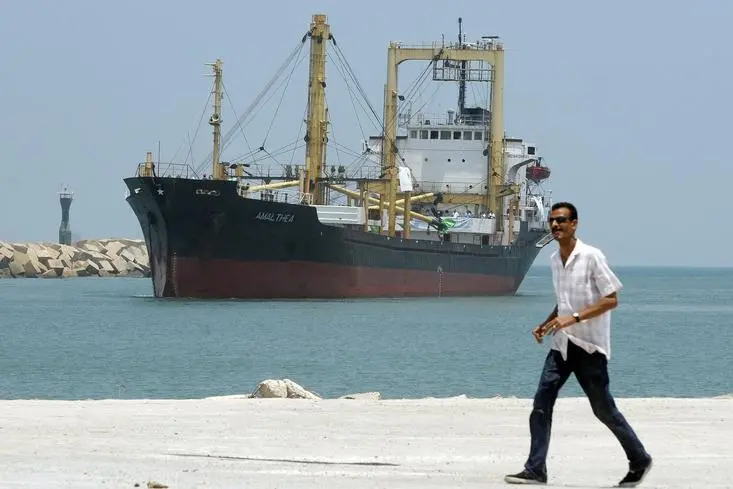PHOTO
Increasing import tariffs might not be the way out of Egypt's foreign currency crisis, reports Mona El-Fiqi
In an attempt to control the imports bill and reduce the demand for foreign currency, the government plans to increase customs duties on a number of imported products.
Believing that many imported goods are luxury items and others have locally manufactured alternatives, the Customs Authority has been commissioned to prepare a list of imports that will be subject to higher tariffs.
The head of the Customs Authority, Magdi Abdel-Aziz, refused to release the names of the targeted products to avoid hoarding by traders in the internal market. He said the list of products will consist of manufactured items and not include raw materials or intermediate goods.
Egypt is facing foreign currency problems, with the country's reserves registering $16.4 billion in October, according to the Central Bank of Egypt (CBE), down from $36 billion before of the ousting of former president Hosni Mubarak in 2011.
Recent data shows rising imports and falling exports, causing a hike in Egypt's trade deficit, which increased by 38.8 per cent to LE34.7 billion ($4.4 billion) in July 2015 from LE25 billion ($3.1 billion) in the same month last year, according to the Central Agency for Public Mobilisation and Statistics (CAPMAS).
The CAPMAS report attributed the rise in the trade deficit to a 24.3 per cent increase in imports, reaching LE47.8 billion ($6 billion) in July, from LE38.5 billion ($4.8 billion) in the same period a year earlier. Exports declined by 2.6 per cent to LE13.1 billion ($1.6 billion) from LE13.5 billion ($1.7 billion).
Measures are being studied to reduce the flow of imports, such as increasing customs duties on some products and limiting imports directed to governmental authorities.
Minister of Industry and Foreign Trade Tarek Kabil announced that the ministry will activate a law that gives priority to locally manufactured products when procuring for government needs in an attempt to reduce the country's total imports bill.
But not everyone thinks the new list is a good idea. "This step will have a very minor impact on the foreign currency market and will not be a solution," Heba Al-Leithy, a professor of economics at Cairo University, said.
"Imposing higher tariffs will not reduce imports or ease demand for dollars. We need to deepen local industry and be able to exchange imported goods with locally manufactured products," Al-Leithy said.
She added that this step should be studied because Egypt, under World Trade Organisation (WTO) regulations, does not have the right to raise tariffs without justification.
Ahmed Shiha, head of the Importers Division at the Egyptian Federation of Chambers of Commerce, told Al-Ahram Weekly he is against the move because it will lead to another wave of high prices that consumers, not importers, will pay.
Shiha blamed local producers for keeping prices artificially high when prices worldwide are down by 30 to 40 per cent. "The government claims that some imported goods are luxury items, but I believe that as long as these products have customers they are needed by consumers," Shiha said.
He added that the move could enable the government to increase tariffs revenues further, which are already up by around 17 per cent, according to the Customs Authority. An increase in tariffs could lead to complaints against Egypt at the WTO and the country's exports would likely face retaliatory tariffs.
"The government says the imports bill, estimated at $60 billion in 2014-2015, is the cause behind the foreign currency shortages in the market, but this is completely untrue," Shiha said.
The government refuses to admit that the monetary policies currently followed by the CBE are the real cause of the problem, according to Shiha.
"Egypt's revenues are sufficient to cover its needs for imports, but the measures set out by the CBE when dealing with dollars hinder foreign currency from reaching the banks," he said.
"Due to the decision that limits the ceiling of dollar deposits in the banks at $10,000 per day and $50,000 per month, the majority of dollars earned by tourism exports and expatriate revenues are circulated in parallel markets," Shiha explained.
Abdel-Aal Ali, deputy chairman of the International Transportation Chamber at the Egyptian Federation of Chambers of Commerce, said the idea of imposing higher customs duties on luxury goods is not a good one because the total value of these goods constitutes a small share of total imports.
"The increase in tariffs will harm Egypt's image in the world rather than reduce its imports. The reputation of Egypt's economy will be affected," he said, adding that the government would be better off controlling the quality of imported products.
He also blamed the CBE measures, saying that they are the reason for the increase in the prices of imported goods and the shortage of dollars in the market.
To solve the foreign currency problem, Shiha said the government should cancel the maximum deposit limit on dollars, suspend the licences of the country's 600 foreign exchange bureaus for six months and oblige them to deposit $50 million as capital in the banks to guarantee the availability of dollars in the market.
The government should require sectors earning revenue in dollars to deposit these in the banks and institute stricter controls on the false reporting of foreign currency revenues.
© Al Ahram Weekly 2015





















